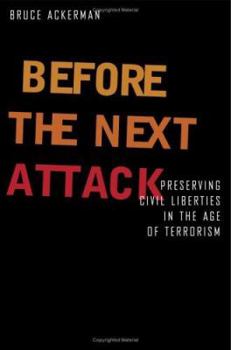Before the Next Attack: Preserving Civil Liberties in an Age of Terrorism
Select Format
Select Condition 
Book Overview
Terrorist attacks regularly trigger the enactment of repressive laws, setting in motion a vicious cycle that threatens to devastate civil liberties over the twenty-first century. In this clear-sighted book, Bruce Ackerman peers into the future and presents an intuitive, practical alternative. He proposes an "emergency constitution" that enables government to take extraordinary actions to prevent a second strike in the short run while prohibiting permanent measures that destroy our freedom over the longer run. Ackerman's "emergency constitution" exposes the dangers lurking behind the popular notion that we are fighting a "war" on terror. He criticizes court opinions that have adopted the war framework, showing how they uncritically accept extreme presidential claims to sweeping powers. Instead of expanding the authority of the commander in chief, the courts should encourage new forms of checks and balances that allow for decisive, but carefully controlled, presidential action during emergencies. In making his case, Ackerman explores emergency provisions in constitutions of nations ranging from France to South Africa, retaining aspects that work and adapting others. He shows that no country today is well equipped to both fend off terrorists and preserve fundamental liberties, drawing particular attention to recent British reactions to terrorist attacks. Written for thoughtful citizens throughout the world, this book is democracy's constitutional reply to political excess in the sinister era of terrorism.
Format:Hardcover
Language:English
ISBN:0300112890
ISBN13:9780300112894
Release Date:April 2006
Publisher:Yale University Press
Length:227 Pages
Weight:0.70 lbs.
Dimensions:0.9" x 6.5" x 9.5"
Customer Reviews
2 ratings
Good place to start
Published by Thriftbooks.com User , 18 years ago
Ackerman's argument is straightforward. Future large scale terrorist attacks are probably going to happen, but happen infrequently. The problem after an attack is the uncertainty about immediate follow-on attacks; if terrorists successfully planned and executed one attack, they may have more in progress. Ackerman fears that in the rush to prevent attacks the President and the administrative organs will accumulate too much power and destroy our liberty. Worse, Presidents will be tempted to claim the country is at war, giving them even more power. Ackerman advocates a temporary state of emergency which the president may declare of his own authority. The declaration would have a built-in sunset provision, with only congress capable of reauthorizing. Reauthorization would require an escalating supermajority; the longer the emergency persisted the smaller a minority of legislators needed to end it. The declaration would permit broad powers of arrest and detention after an attack. Such measures would presumably mitigate the risk of further attacks, as well as re-establish national sovereignty. The book is thought provoking and worth reading, but there are problems with Ackerman's ideas. He assumes that the most pressing need in the immediate aftermath of an attack will be to reassure the public that measures are being taken to prevent further attacks. Reassuring the public is a concern, but I think it overextends a factor unique to 9/11. The actual attacks on 9/11 and the time needed to restore order was short. Aside from those stuck because of the airspace shutdown, most people were back to normal within a few days. The system disruptions were minimal. Such a short event period is unlikely in future large scale terrorist attacks. Dirty or nuclear bombs, chemical or biological weapons will involve much greater disruptions for a longer period of time. The event will look more like Katrina then 9/11. Massive social breakdown, no police or fire services, looting, confusion over evacuation destinations and means of transportation, these problems will last for weeks if not months. Plus, any response will be hamstrung by the need to protect responders from the contaminant (radiation, virus, chemical residue on skin or clothing). So at the time Ackerman thinks feds will be rounding up thousands of suspected terrorists most national systems will likely be overwhelmed just coping the direct aftermath of the attack. An even bigger problem is with Ackerman's assumption that terrorist attacks will be infrequent. This implies that the administration is capable of effectively stopping most attacks. If it fails to do so, wouldn't that initiate further restrictions of liberty which Ackerman fears? Put another way, if terrorists successfully execute an attack under existing laws, it implies those laws are inadequate to prevent terrorism. Cheap information flow implies the holes or flaws in the law will be exploited with increasing freq
A Useful Book
Published by Thriftbooks.com User , 19 years ago
This is a pretty good book for people concerned about possible deterioration of American civil liberties in the event of further successful 9/11-type attacks. It is almost impossible to amend the U.S. Constitution. So Ackerman proposes laws that could be enacted by Congress and states that would help do this. It should be read in conjunction with Richard Posner's Catastrophe, which makes a case for some curtailment of civil liberties, given the dangers of the age we live in.






